Organisational design and development made easy.
Engage
|
Hire
|
Develop
|
Assure
|
|
Deeply understand your organisation with science-backed analytics on your culture, team design, and engagement. |
Automatically match to candidates who are a great fit for your team culture and who are intrinsically motivated to succeed. |
Back your onboarding, compliance and skill development with industry-leading credentialling, competency and capability expertise.
|
Reimagine skills assessment and certification with dedicated tools designed to elevate your competency frameworks.
|
How we do it
Resources
Log in
.png?width=383&height=200&name=team%20(1).png)
Me, MY TEAM, My Company
My work personality is:
The Auditor 🔍
"Let's focus on the details!"
Your personality has been mapped against the types of work crucial for high-performing teams.
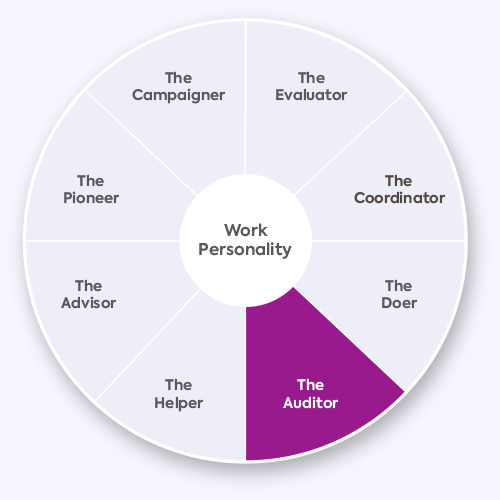
Introduction
This personality type embodies thoroughness, accuracy, and an exacting mindset coupled with a reflective and contemplative nature. Auditors are naturally drawn to fact-based, intricate tasks, persisting patiently until they reach their goal.
They are a unique blend of diligent detail-orientation and thoughtful introspection. Their cautious disposition and risk-averse approach further set them apart.
Main preferences for work
Auditors are known for their precision, with an incredible ability to place focus on the minute details of the present. They cherish a systematic approach to work, enforcing standards, procedures, and control mechanisms. High value is placed on thoroughness and accuracy in all tasks and there's a deep sense of satisfaction in maintaining order and compliance.
- Enjoys scrutinising and inspecting.
- Prefers to focus on present details and precision.
- Enforces standards, procedures, and control mechanisms.
- Values thoroughness and accuracy in all tasks.
- Finds satisfaction in maintaining order and compliance.
Potential blind-spots at work
In our deep dive into work personalities, we focused on their strengths, but now it's time to shed some light on potential blind spots. These not-so-obvious areas may occasionally hamper their productivity or work relations. From getting overly engrossed in minute details to resistance towards rapid, innovative changes, let's unpack the areas where an Auditor may need to tread carefully.
- May become overly focused on minor details, missing the bigger picture.
- Can be slow in decision-making due to excessive deliberation.
- Might resist quick or innovative changes that disrupt established methods.
- Occasionally struggles with tasks requiring high levels of creativity.
Tips for collaborating with this personality type
Known for their keen eye for detail and firm grip on standards and protocols, interacting with them brings a unique dynamic to the workplace. Here, we've compiled a comprehensive list of do's and don'ts that will enhance your collaborative efforts with an Auditor.
Do's
|
Don'ts
|
Knowing Me (worksheet)
Jam-packed with insightful questions, this is a worksheet all about you. Yes, you heard it right, YOU.
This worksheet is intended to help you delve deeper into your work personality and understand how you tick. And once you gain clarity about yourself, you won’t be keeping it a secret.
The "Knowing Me" worksheet is a fantastic way to share your insights with your team. By inviting your colleagues into your world, you are encouraging a more cohesive and understanding work environment.
So, let's get down to business and start filling it out, shall we?
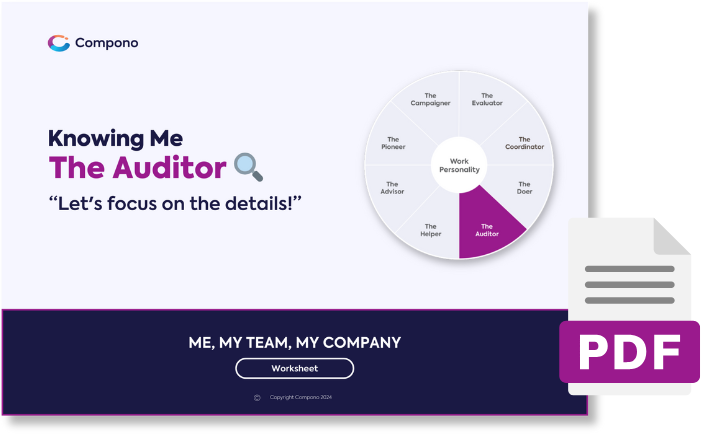
- Are you skilled at paying careful attention to detail and ensuring task accuracy and completion?
- Can you provide grounded and realistic perspectives on immediate issues?
- Do you tend to work in a reliable and consistent manner?
Remember, these examples are just a starting point - your worksheet is your canvas to fill with your own unique colors and shades.
Guess who?
Peer into the minds of the world's most influential leaders 📣
Ever wondered if you share a personality type with Nelson Mandela, Steve Jobs, or perhaps Mother Teresa? Here's your chance to find out, but there's a catch! We aren't revealing them upfront.
Try guessing them first. As you click each mystery card, the leader will be revealed.
These leaders are reserved, detail-oriented, methodical, cautious, dependable, and thorough. 🤔

He co-founded a tech giant and is known for his analytical and detail-focused approach to business.
Bill Gates 🔍
Co-founder of Microsoft, known for his analytical and detail-focused approach to business and technology.

A former VP of Retail in tech, she is celebrated for her methodical leadership and emphasis on operational structure.
Angela Ahrendts 🔍
Former VP of Retail at Apple, known for her methodical leadership and focus on building a strong operational framework.

Leading a tech powerhouse, he is renowned for his reserved and detailed leadership style that puts precision first.
Satya Nadella 🔍
CEO of Microsoft, admired for his quiet, reflective, and detail-focused leadership style that emphasises thoroughness and precision.
Want to guess more influential leaders?
Career paths
The Auditor is best known for their attention to detail, practicality, and ability to work independently. They thrive in careers that need precision, methodical processes, and are well-suited to roles that allow them to apply their analytical skills.
Whether it's examining data, interpreting complex information, or evaluating systems for efficiency, their precise and diligent nature sets them up for success.
They excel as Financial Controllers, focusing on company finances and ensuring everything is in order. Their independent nature allows them to flourish as Surveyors, Pharmacists, or Civil Engineers, where precision is paramount.
They can also show their prowess as Data Analysts or Quality Control Analysts where keen observation and analytical skills are at a premium. Since Auditors are natural problem solvers, careers like Mechanics, Carpenters, or Electricians can let them put their practical skills to use.
The full list:
- Surveyor
- Financial Controller
- Mechanic
- Electrician
- Pharmacist
- Civil Engineer
- Librarian
- Data Analyst
- Auditor
- Carpenter
- Paralegal
- Healthcare Administrator
- Veterinary Technician
- Archivist
- Accountant
- Statistician
- Quality Control Analyst
- Compliance Officer
- Administrative Assistant
Leadership style
Individuals have natural or preferred leadership styles that align with their personality types.
For Auditors, they may find aspects of their preferred leadership style easier or more challenging in certain circumstances. But that doesn't mean they can't adapt to specific situations.
Effective leaders are flexible and change their approach based on the situation.
By remaining flexible in their approach, Auditors can harness their strengths while also adapting to the team's needs and the demands of the task.
The Auditor's natural leadership style is:
Non-Directive Leadership
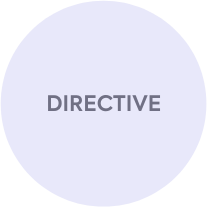
Directive Leadership involves providing clear instructions and goals, and expecting a structured approach from the team.

Democratic Leadership advocates for collaboration, shared decision-making, and appreciates team contributions.
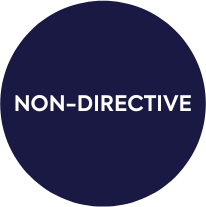
Non-Directive Leadership allows for team autonomy, offering guidance only when required.
What does this mean? 🤔
Non-Directive Leadership takes a hands-off approach, providing teams with autonomy and trusting them to make their own decisions. Leaders using this style focus on empowering their team, offering guidance only when necessary.
This leadership style is effective in environments that rely on innovation, where highly skilled teams require minimal supervision and are trusted to manage themselves. Read more.
HOW to ADAPT TO other situations
Any leadership style can be adjusted to fit different situations and team needs.
Click each tab below to discover what's easy and hard when adapting to each leadership style.
Select an option below:
- Directive
- Democratic
- Non-Directive
What's easy?
Auditors will excel in directive leadership when it involves clear, structured processes and well-defined goals. They are comfortable following and providing precise instructions.
Blindspots?
They may struggle with adapting to changing or ambiguous situations that require flexible problem-solving.
What's easy?
Auditors naturally enjoy non-directive leadership when they have well-defined processes in place and can work independently without much interference.
Blindspots?
They may struggle with situations where the lack of clear direction leads to uncertainty or inconsistency in execution.
What's easy?
Auditors can appreciate democratic leadership when they are invited to contribute detailed, methodical insights to the decision-making process.
Blindspots?
They may find it hard to participate in open-ended discussions that lack clear direction or when decisions are made based on emotions rather than facts.
Want to be sure if
Directive Leadership,Democratic Leadership,Non-Directive Leadership
is right for the current situation or decision your team faces?
In 10 short questions, find out the most appropriate leadership approach you can use for every team situation.

Resolving conflict in teams
For leaders, conflict within a team can seem like a daunting challenge.
Yet, when equipped with a deep understanding of each team member's unique personality, leaders can harness these moments to foster growth, spark innovation, and cultivate harmony.
Below is practical advice for leaders to navigate such scenarios effectively, based on the personality types in their team.
Click each personality type below to see practical advice for a leader to manage conflict with the Auditor.
-
Helper 🤝 Auditor
Guide the Helper to value detailed planning, e.g., “This thorough approach will benefit the team in the long run—how do you feel about it?”
Encourage the Auditor to consider emotional aspects of decisions, e.g., “How might these details impact the team’s morale?”
-
Advisor 🤝 Auditor
Help the Advisor focus on specifics, e.g., “We need to make sure all the details are accounted for before we finalise.”
Guide the Auditor to engage more collaboratively, e.g., “Let’s integrate your detailed input into the broader plan.”
-
Pioneer 🤝 Auditor
Guide the Pioneer to appreciate structure, e.g., “Let’s ensure we address all the details before implementing this idea.”
Help the Auditor remain open to innovation, e.g., “Let’s explore how this creative idea fits into your detailed framework.”
-
Campaigner 🤝 Auditor
Help the Campaigner communicate clearly and patiently, e.g., “Let’s walk through the plan step by step.”
Encourage the Auditor to engage earlier in the discussion, e.g., “We need your detailed perspective—can you provide some initial feedback?”
-
Evaluator 🤝 Auditor
Encourage the Evaluator to take a step back and reflect on specifics, e.g., “Can we address these details before finalising the plan?”
Help the Auditor share detailed feedback earlier and more regularly, e.g., “Can you share your insights on this part of the project?”
-
Coordinator 🤝 Auditor
Help the Coordinator respect detailed input, e.g., “Can we take the time to ensure all details are correct?”
Encourage the Auditor to participate more actively in discussions, e.g., “Your feedback is essential—please share it with the team earlier.”
-
Doer 🤝 Auditor
Help the Doer slow down and focus on details, e.g., “Let’s take time to ensure we’ve covered all the details before moving ahead.”
Encourage the Auditor to engage earlier in discussions, e.g., “We need your feedback—how can we incorporate your detailed input into the plan?”
-
Auditor 🤝 Auditor
Encourage both Auditors to prioritise key details, e.g., “What are the most critical elements we need to address before moving forward?”
Help them set a reasonable deadline for decision-making, e.g., “Let’s aim to finalise the plan by the end of the week.”
DOES EVERYONE PLAY NICELY IN THE SANDPIT? 😉
Share the personality assessment with
your team and find out how to get along.
👇
Your personality has been mapped against the types of work crucial for high-performing teams.
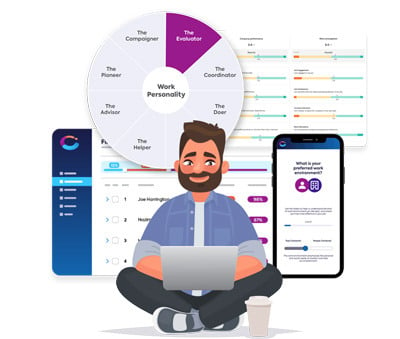
Designed by corporate psychologist, Rudy Crous.
Research identifies 8 key work types crucial for high-performing teams. If any work type shows weakness within a team, leaders can analyse the gaps and create plans to strengthen performance.
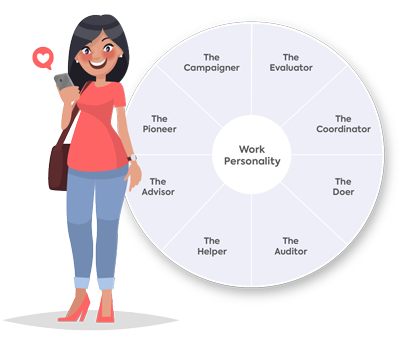
What is your Work Personality?
Reading a colleague's profile?
Or keen to take the assessment again?
Take this simple assessment and arm yourself with the insights needed to drive your performance to the next level.
Build high performing teams and individuals
Want to see more?
Our organisation design and people insights platform guides strategic people leaders to find their blind spots and take instant, actionable steps to improve.
Identify what "good" looks like
What makes your high-performers tick? Find out how they think so you can replicate their success across the business.
Reduce conflict and improve team collaboration
Help managers find potential areas of conflict in teams so that they can improve collaboration and performance.



